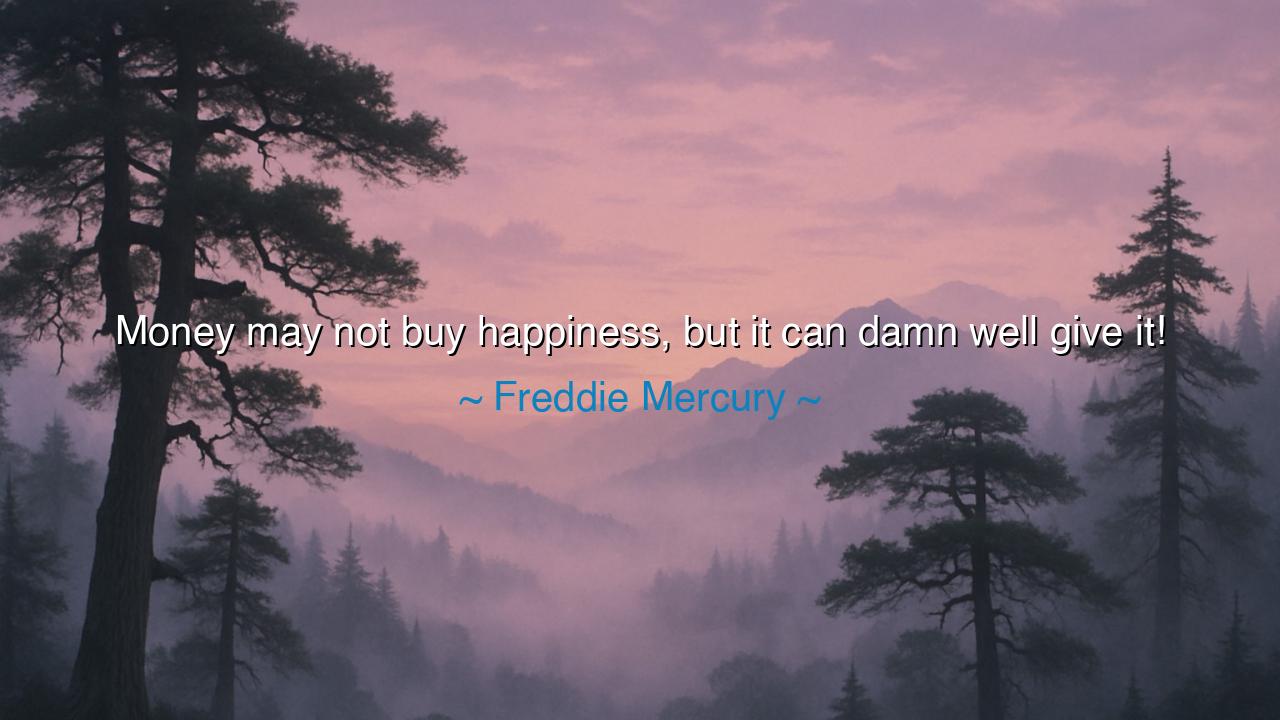
Money may not buy happiness, but it can damn well give it!






“Money may not buy happiness, but it can damn well give it!” Thus spoke Freddie Mercury, the brilliant and unrestrained voice of Queen, a man who lived with the intensity of a comet and the grandeur of a king. His words, at once defiant and playful, shine with a paradoxical wisdom: they mock the moralists who dismiss wealth as hollow, yet they reveal the deeper truth that money, when placed in the hands of a passionate soul, can amplify joy, enable freedom, and give form to the art of living. In this quote, Mercury captures the wild heartbeat of the human desire to live fully — to use what one has to create beauty, connection, and unforgettable experience.
The meaning of this saying is not that happiness can be bought, but that material resources can serve as instruments of expression. Money, though lifeless on its own, becomes powerful when animated by spirit. It can buy the piano that composes symphonies, the stage that holds a dream, the home that shelters those we love. In Mercury’s eyes, wealth was not an idol to be worshipped, but a tool to carve one’s own path — a means of giving shape to joy. The danger, he seems to say, is not in wealth itself, but in forgetting the soul that must direct it.
To understand the origin of these words, one must look to Mercury’s own life. Born Farrokh Bulsara in Zanzibar, raised in modest means, he ascended from obscurity to global fame through talent, vision, and audacity. He knew poverty’s limitations and luxury’s temptations. When he declared that money could “give” happiness, he spoke not as a cynic but as one who had tasted both want and abundance. For him, success was never about accumulation but about creation — about giving voice to the music within and sharing it with the world. His palaces, his parties, his lavishness — all were extensions of his artistry, expressions of a spirit unwilling to shrink before life’s grandeur.
History, too, offers mirrors to this truth. Consider Ludwig II of Bavaria, the “fairy-tale king,” who used his vast wealth not for conquest but for beauty — to build castles that seemed dreamt by gods, to nurture composers like Richard Wagner, whose music reshaped the soul of Europe. Or think of Andrew Carnegie, who, having amassed immense fortune, spent his later years giving it away to found libraries and universities — gifts that continue to enrich minds and hearts. In both, we see that money, when guided by vision, becomes more than mere possession; it becomes service to joy, a channel for light.
Yet there is caution in Mercury’s laughter, for he knew that money alone cannot fill the silence of a lonely heart. Many who chase wealth without purpose find themselves emptier than before. True happiness — the kind that lasts beyond applause — is born from authenticity, from love, from the courage to be oneself. Mercury’s genius was not in what he owned, but in his freedom to create and to live unashamedly. Money gave him the means, but his spirit gave it meaning.
To live by this wisdom, one must learn the art of balance. Seek not wealth for its own sake, but use it as a vessel for joy, generosity, and creation. Let it support your dreams, not enslave them. Invest not only in possessions, but in experiences that enrich the heart — in art, in friendship, in kindness. For it is not the coin that brings happiness, but the choice of what to do with it.
The lesson is eternal: money is a mirror, reflecting the soul that holds it. In noble hands, it builds; in greedy hands, it destroys. So, my child, do not fear it nor worship it. Let it serve your freedom, your creativity, your love of life. For as Freddie Mercury, the immortal showman, taught us — money may not buy happiness, but when guided by passion, it can indeed give it, like music pouring from the heart of a piano, echoing long after the final note is played.






AAdministratorAdministrator
Welcome, honored guests. Please leave a comment, we will respond soon